Fulani tradition describes human life as an initiatory journey through nine stages, in which one gradually becomes a bearer and transmitter of ancestral wisdom.
The great journey of man in fulani tradition
In 1960, before the General Assembly of UNESCO, Amadou Hampâté Bâ rose as a defender of forgotten African wisdoms. In that spirit, a foundational teaching transmitted within Fulani societies reminds us that human life is paced by nine degrees of initiation.
A path from childhood to old age, conceived not as a simple succession of ages but as a progressive school for the soul.
Man: Everything and nothing in fulani tradition
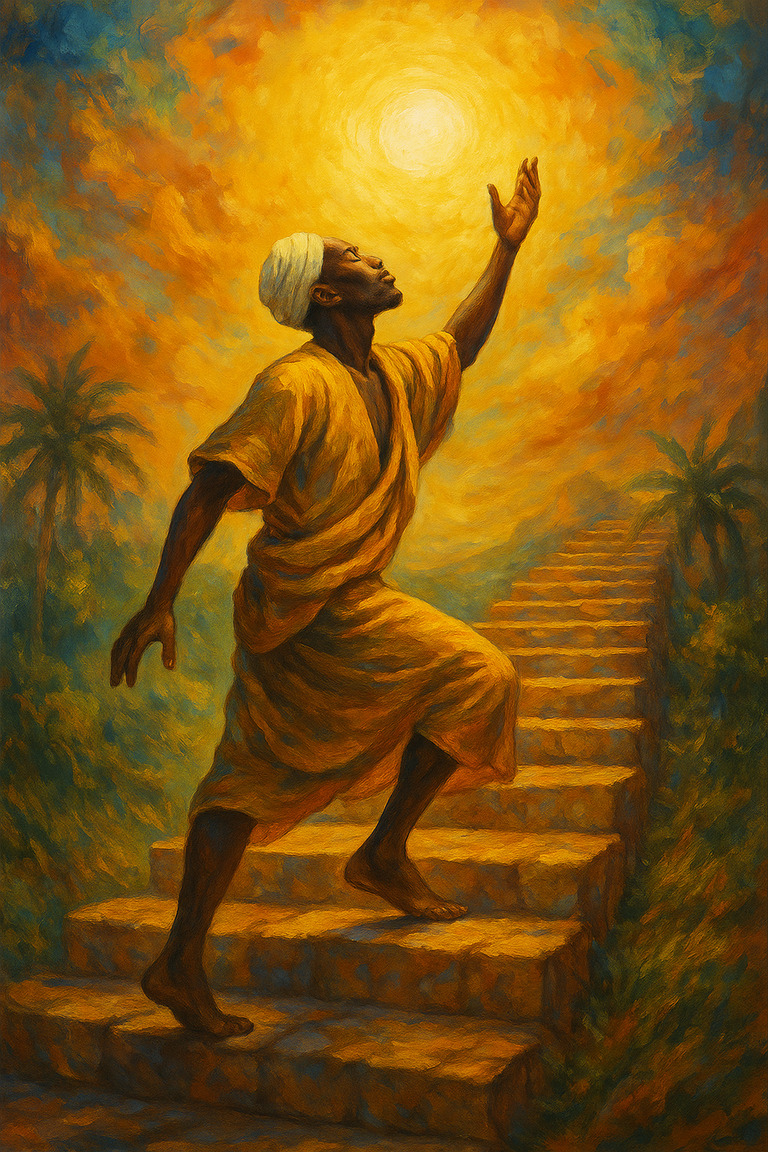
In Fulani spiritual tradition, the human being is a living paradox.
Everything, because he is illuminated by a spark of the creative force. Every man, every woman carries within them a fragment of divine power—an original energy that links them to the greater Whole. This sacred element is not abstract: it endows humans with the capacity to understand, to create, to love, and, above all, to transcend themselves.
Nothing, because from the moment of birth into matter, man is weighed down by the heaviness of his body, by desire, by fear, by ignorance.
Fulani tradition compares this human condition to a constant fever: a sickly heat that blurs vision, alters judgment, and diverts man from his divine origin.
Thus, life becomes a path of awakening:
- First numb, man must gradually overcome the inertia of his material nature.
- Each stage of existence is a struggle to reclaim inner clarity, to rekindle the flame from which he came.
This battle is not a brutal confrontation but a slow ascent, paced by precise cycles (the “nine degrees”) and the requirement of constant self-work.
To not progress is to regress. In this teaching, human life is never static:
It is movement, initiation, permanent transformation.
Through this dual definition (everything and nothing), Fulani philosophy expresses a vision that is both deeply spiritual and rigorously demanding of the human condition.
To be born a man is not an achievement: it is only the chance to become fully human.
The first cycle: Foundational learning (Ages 0–21)
In the Fulani view of human existence, the first twenty-one years form a decisive cycle, where the human being receives the foundations of their spiritual, social, and intellectual identity. This cycle is divided into three seven-year stages, each corresponding to a degree of initiation.
From 0 to 7: The school of the mother

At the beginning, the child is completely immersed in the maternal world.
The mother is not only a source of nourishment and care: she is the interpreter of the world.
Everything the child sees, hears, or experiences must pass through the mother’s mediation:
- Is what my father told me true?
- Should I believe what I saw at the neighbor’s house?
- Is it good to do this or that?
The mother holds sacred authority over truth, as she is the first guardian of knowledge and morality. At this tender age, the child’s mind is malleable; it is the moment when the first lines are inscribed on the tablet of the soul.
From 7 to 14: The school of the outside world
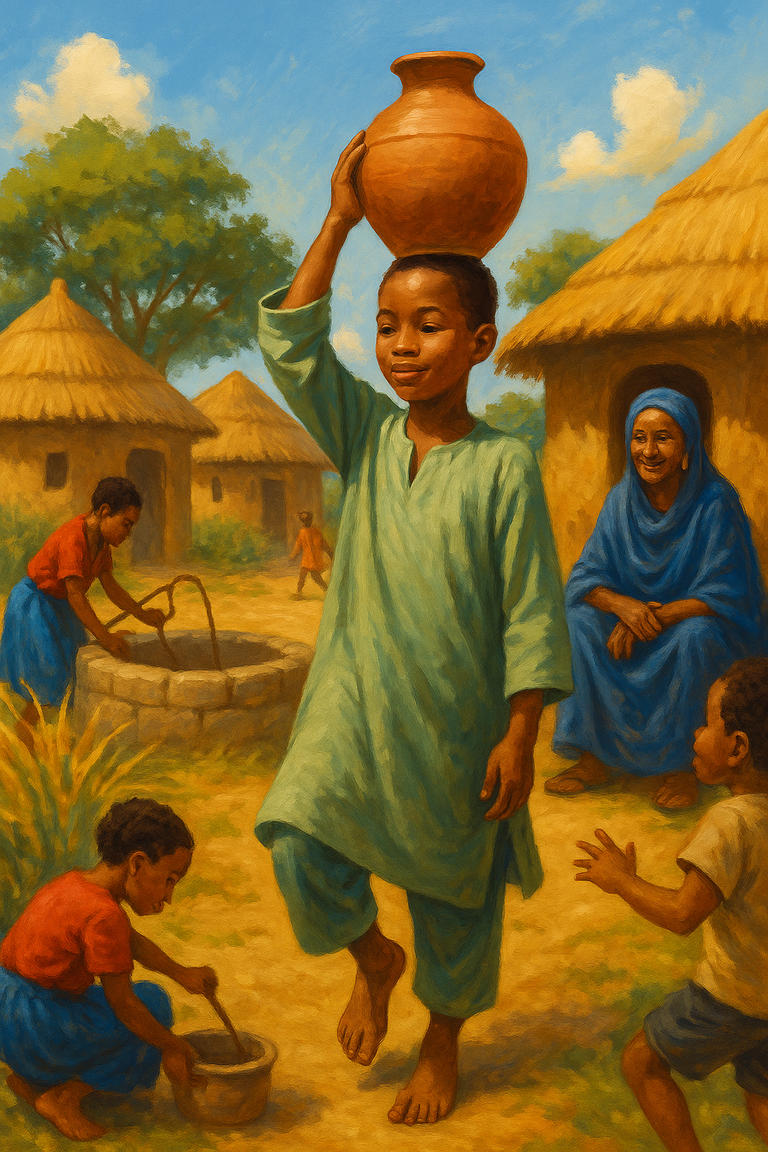
From the age of seven, the child opens to the outside world.
The universe expands: peers, teachers, household chores, or village tasks become parallel schools.
In Fulani tradition, everything is a lesson:
- Puiser de l’eau au puits enseigne la discipline.
- Jouer apprend la coopération ou la ruse.
- Écouter les anciens transmet des valeurs invisibles.
Still, even in full discovery, the child continues to consult the mother. He does not yet fully trust what he learns outside without the approval of the one who was his first light. This constant movement between curiosity and security shapes the balance of the young spirit.
From 14 to 21: Individual affirmation
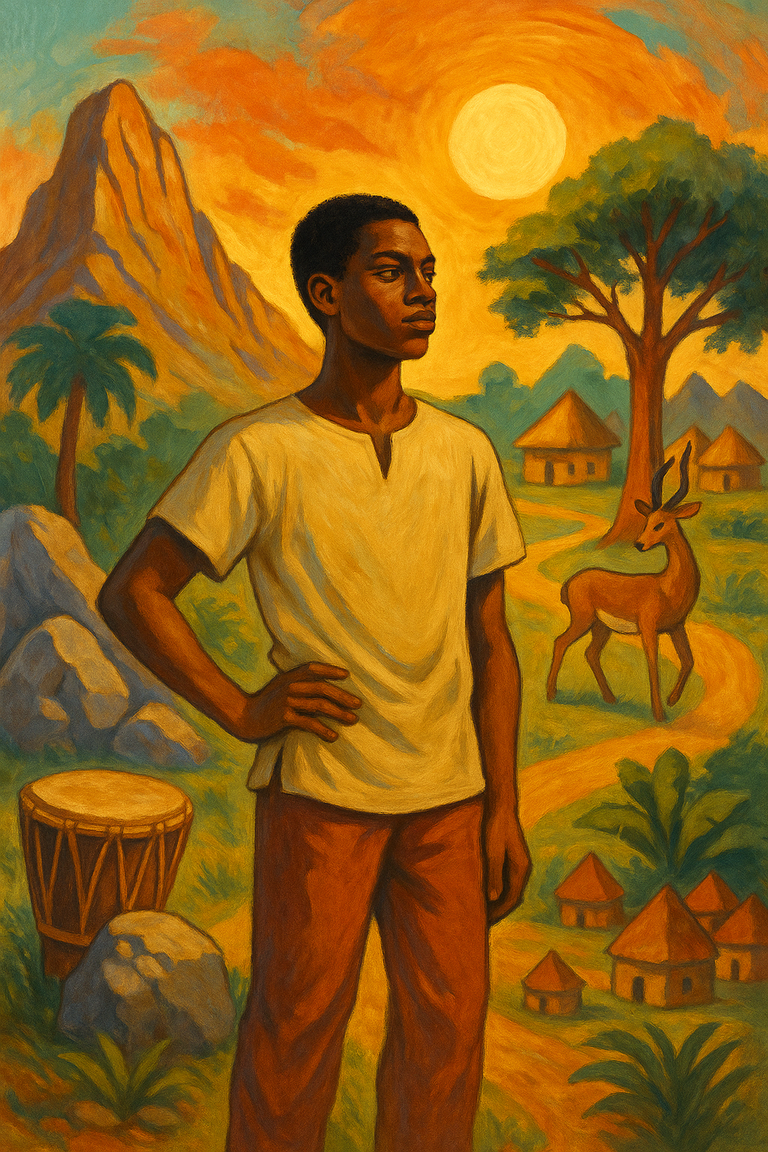
At fourteen, the adolescent enters a phase of gradual rupture.
He begins to oppose his own reasoning to that of his educators.
He debates, questions, sometimes even challenges his mother—proof that he is becoming a thinking being, no longer only a receptive one.
At this age, tradition demands that the adolescent be exposed to the knowledge of the four realms:
- Mineral (earth, stones, mountains)
- Vegetal (trees, plants, agricultural cycles)
- Animal (moving creatures, hunting spirits)
- Human (social structures, alliances, conflicts)
This first, long and progressive cycle shapes a partially awakened being, ready to begin the ascent toward the higher truths of existence.
By age 21, he has completed his first overview of earthly life, but is still only an apprentice of Being.
The second cycle: Strengthening the self (ages 21–42)
In Fulani tradition, the path to maturity is not complete with the mere acquisition of knowledge. Once the first life cycle is completed at 21, a more demanding phase begins: the deepening of the self, where one no longer just learns, but must understand, assimilate, and test the value of each teaching.
Deepening
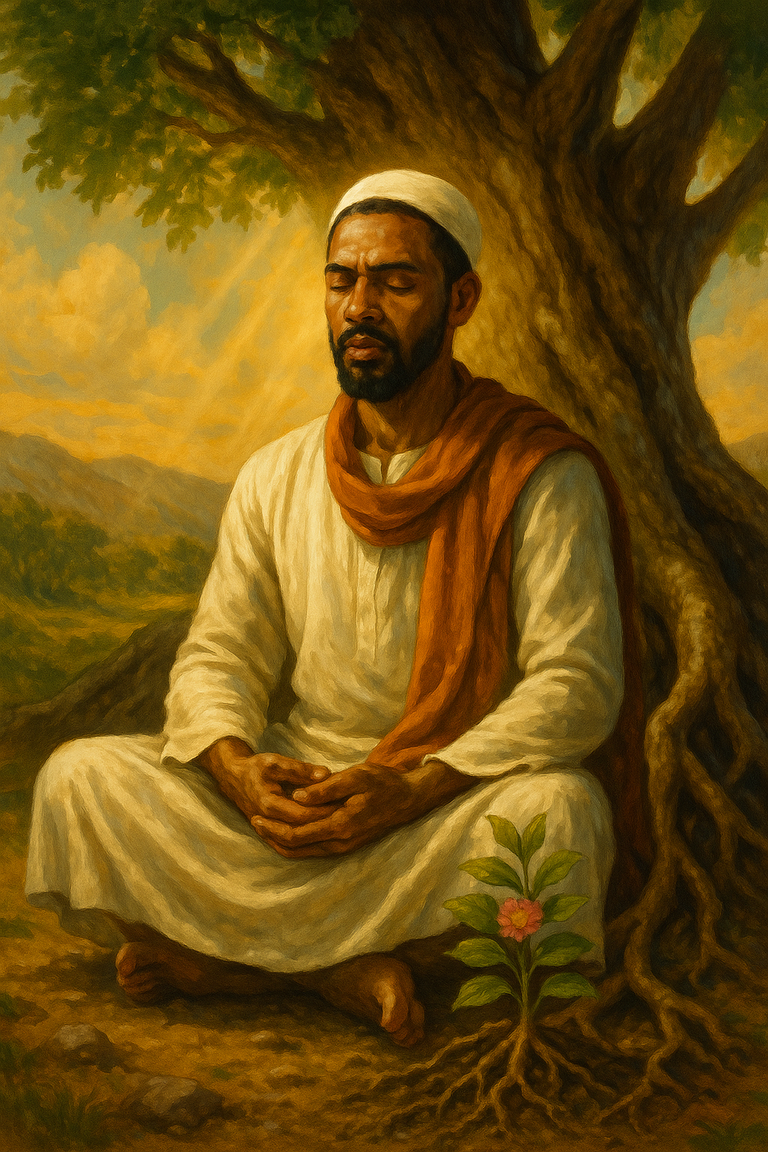
From 21 to 42, the individual undergoes a second initiatory journey, but this time inwardly.
What he learned about the mineral, vegetal, animal, and human realms is no longer merely observed: it must be experienced.
Transmitted truths must be tested, confronted with real-life trials.
He must purge himself of illusions, conquer emerging pride, temper the exuberance of youth.
This period is marked by a demand for depth and patience: it is no longer enough to know; wisdom must be earned.
Like a plant that has blossomed, the man must now root his virtues so that the storms of life do not tear him away.
Age 42: The right to speak
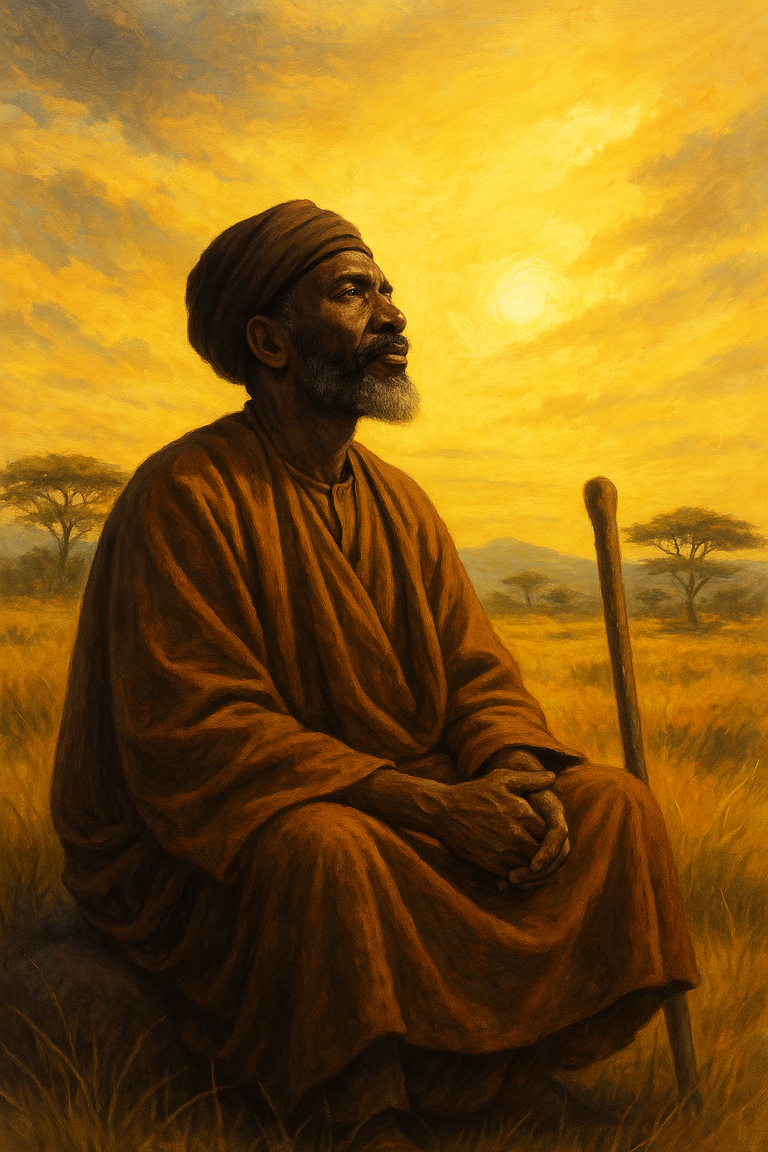
Only after this long inner journey, at age 42, is a man allowed to speak publicly.
This right is not merely a reward of biological age:
- It confirms that the individual has solidified his inner being.
- He can now teach without flattery, advise without pride, arbitrate without anger.
From the age of 42 onward, he is regarded as a sage in the making, a pillar of the community whose words—measured and matured—can guide the young and uphold collective order.
Fulani tradition affirms that speech is a late fruit:
It must ripen in silence, be nourished by life, and filtered through consciousness.
The third cycle: Supreme transmission (ages 42–63)
In Fulani life philosophy, knowledge has meaning only if it is given back.
After 42, man no longer belongs to himself: he becomes a source.
The duty of transmission
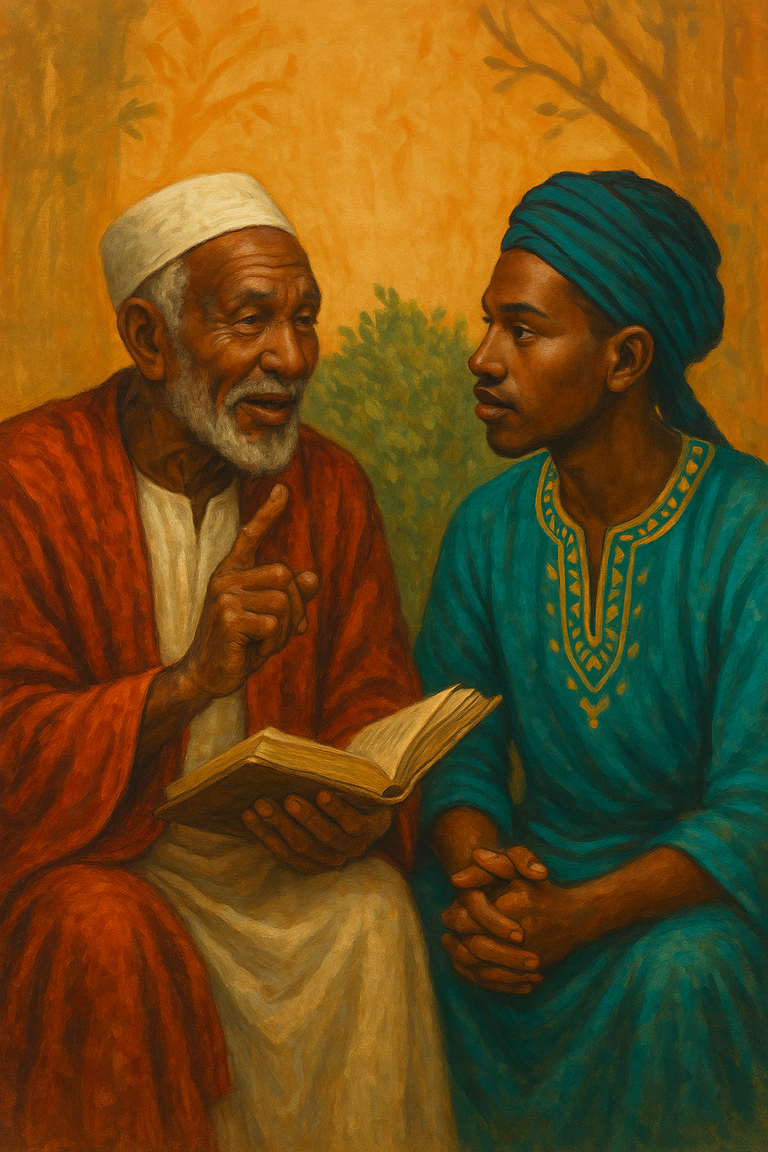
Between 42 and 63 years old, acquired wisdom must no longer be kept silent:
- One must teach, correct, guide those who are still climbing their own initiatory path.
- Every piece of advice, every arbitration, every story becomes a sacred act of transmission.
The man, matured by two 21-year cycles, must now fertilize society with his experience, just as the elders once nourished him.
In this phase, silence is no longer a virtue: it becomes a failing if experience is not shared.
The Fulani elder is not just an old man:
He is a gardener of memory, responsible for the continuity of knowledge and values.
At 63: The honor of withdrawal

At 63, the social mission is complete. The man is said to be “out of the herd,” according to a beautiful pastoral metaphor:
Like an old bull released from the enclosure, he is no longer bound by communal obligations.
He remains a moral reference, honored for his journey, but is no longer expected to teach actively.
The Fulani society sees in this withdrawal not a loss, but a consecration:
The sage enters another dimension of existence—one of contemplation, silent blessing, and sometimes spiritual preparation for the final crossing.
Thus concludes, with majesty, the triple cycle of human life according to Fulani tradition:
Birth, Affirmation, Transmission.
Three stages for a single quest: to achieve the fullness of being.
Becoming fully human
For Fulani wisdom, to live is not merely to move through time; it is to patiently climb the steps of one’s own being.
Each stage of life (from childhood under the maternal wing to the golden age of transmission) forms a sacred apprenticeship designed to reconnect man to his divine origin.
The traditional Fulani does not measure life by its length, but by the quality of consciousness cultivated throughout it.
The ultimate honor is not to have lived long, but to have taught, uplifted, and preserved.
And perhaps, as the elders taught, to leave this world having brought more light than one found.
Primary Source:
Ange Casta, Un certain regard, documentary aired on France’s first television channel, September 7, 1969.
Summary
- The Great Journey of Man in Fulani Tradition
- Man: Everything and Nothing in Fulani Tradition
- The First Cycle: Foundational Learning (0–21 years)
- Ages 0 to 7: The School of the Mother
- Ages 7 to 14: The School of the Outside World
- Ages 14 to 21: Individual Affirmation
- The Second Cycle: Strengthening the Self (21–42 years)
- Deepening
- Age 42: The Right to Speak
- The Third Cycle: Supreme Transmission (42–63 years)
- The Duty of Transmission
- At 63: The Honor of Withdrawal
- Becoming Fully Human
- Primary Source
